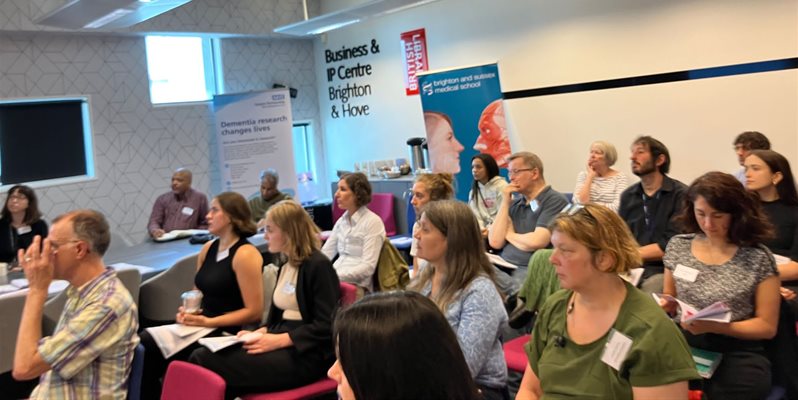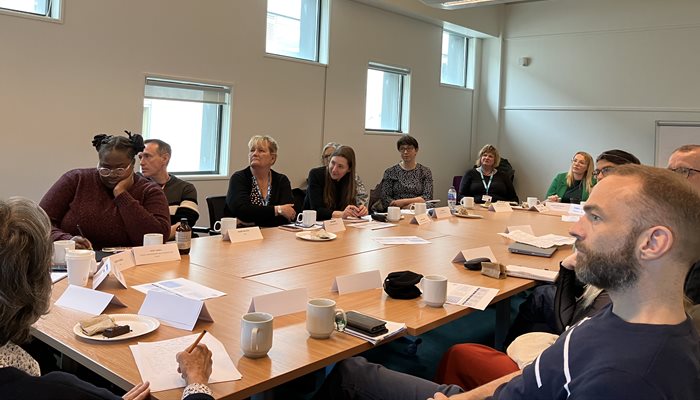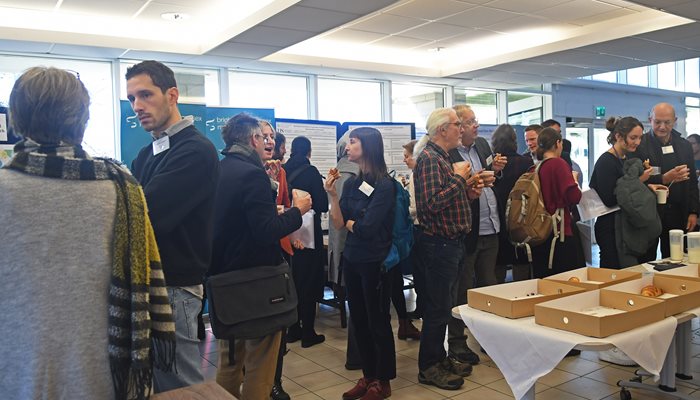Examples of our knowledge exchange activities
BSMS hosts Lifestyle and Cognitive Health Symposium
Prof Dorina Cadar, Senior Lecturer in Cognitive Epidemiology and Dementia at BSMS, led the Lifestyle and Cognitive Health Symposium on 13 July 2023 at the Jubilee Library in Brighton in collaboration with ARC KSS, Brighton & Hove City Council, and the UK Health Security Agency (UKHSA). The symposium was attended by more than 35 people in person and 12 people online. The programme comprised various talks delivered by researchers from BSMS, the University of Sussex, the University of Brighton, University College London, Birkbeck College, ARC KSS, local public practitioners from Brighton & Hove City Council, and government representatives from the UKHSA. The topics covered included modifiable risk factors for cognitive impairment and dementia, social engagement and other determinants of successful cognitive ageing, types of fatigue and biological mechanisms, and governmental initiatives to support healthy ageing. The aims of the event were to break down barriers between research and community, offering opportunities for open dialogue to involve, interact with and listen to voices of wide sections of society with the goal of generating mutual benefit and enabling possibilities for community planning. Members of the public interacted with the speakers and shared their lived experiences.

Sussex team’s deal takes them one step closer toward developing a treatment for ALS disease
A group of researchers led by a professor at Brighton and Sussex Medical School, and backed by the University of Sussex, has signed an exclusive licence agreement with ILTOO Pharma in Paris, France to enable them to develop a potential treatment for amyotrophic lateral sclerosis (ALS).
ALS is the most common type of Motor Neurone Disease. MND affects up to 5,000 people in the UK at any time and is a progressive disease for which there is no cure. The prospect of a treatment which could extend and improve patients’ lives could offer a ray of hope for many people. The group of researchers is called the “MIROCALS” consortium. They have signed a worldwide licensing agreement with ILTOO Pharma in Paris. The agreement means the pharmaceutical company can use the data from the research to develop low dose interleukin-2 (IL-2) as a treatment.
Read the full story here >
Roundtable on Advances in Dementia care and living well with Dementia
Professor Naji Tabet, Katherine Sykes, and Dr Rebecca Atkinson led a round table discussion with key stakeholders working across dementia services throughout Sussex to explore the impact of new advances in dementia diagnosis and treatment on the care of people living with dementia in our region. After hearing about new developments, the dementia programme in Sussex, new NHSE proposals for Dementia, and the challenges faced by people diagnosed with dementia, the group explored how ready Sussex is for advances in Dementia diagnosis and treatment and how they can work better to deliver services for people living with dementia across our integrated system.

CISC Open Day
On 8 December 2022, the Clinical Imaging Sciences Centre (CISC) celebrated its 15th anniversary with an open day. The event brought together almost 100 researchers and leaders in the area of imaging, including chemists, pharmacologists, biologists, physicists, computer scientists, clinicians and associated areas along with industrial communities to engage in thought-provoking discussions. The aim was to showcase CISC, its people, research and equipment, and thereby to facilitate and encourage new collaborations with researchers from our partner universities, clinicians and the industrial sector.
Read more about CISC here >

Are we ready for personalised medicine to treat children’s asthma and allergy?
A public engagement event was facilitated by Professor Somnath Mukhopadhyay on 11 August 2022 at the Jubilee Library, Brighton. Professor Mukhopadhyay gave a talk highlighting the opportunities for a new "one-size-fits one" as opposed to our current "one-size-fits-all" approach for medicine. This could tackle current un-met needs within medicine. For example, despite improvements in protocols and large investments in healthcare, over a third of children with asthma continue to suffer from poor control. We explored the role of personalised medicine in addressing this problem. We explored how a recent BSMS-led trial has shown improvements in quality-of-life using this approach in children with inadequately controlled asthma. This facilitated a discussion on how the results of this trial and related work can be translated into practice, and whether that could lead to a meaningful impact on the lives of children with asthma. The participants were very motivated, and included parents, charity representatives, and hospital and university staff, and represented a primarily non-academic audience. The CEO of Rockinghorse Charity and officials from Action Medical Research attended the event and these charities are working collaboratively to advance research and co-create solutions.